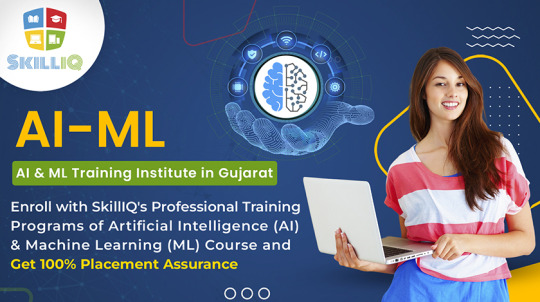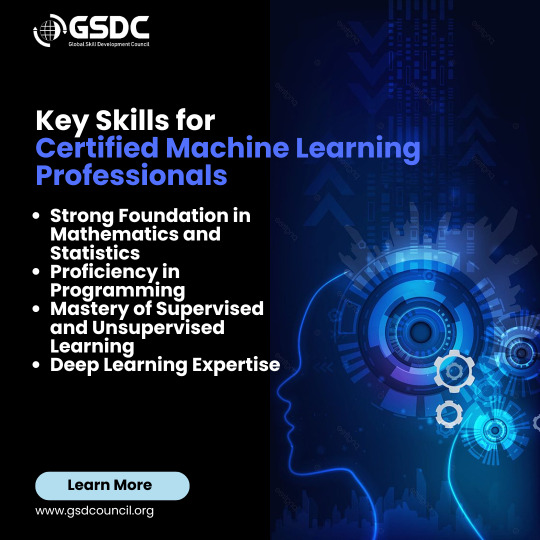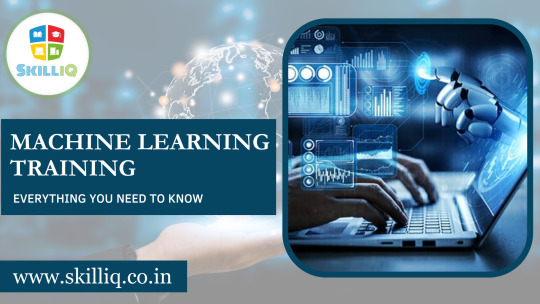#Machine Learning Certification
Explore tagged Tumblr posts
Text
Artificial Intelligence & Machine Learning’s Future Contribution

It is sometimes included together with Deep Learning, a recent branch of machine learning research. However, given the cutting-edge research taken on in the field of Deep Learning in particular, it is crucial for all AI enthusiasts to comprehend and stay up to date with the goal of bringing Machine Learning closer to one of its original goals Artificial Intelligence.
The main applications of data in the world we live in today are artificial intelligence and machine learning. Due to this, machine learning is one of the most in-demand fields today, and there is a significant demand for people in the field with the necessary knowledge, training, and practical experience. Great Lakes Post Graduate Program in Machine Learning was created with the express purpose of educating professionals in technologies and techniques used in the real world of business.
What is Artificial Intelligence & Machine Learning?
Artificial Intelligence, which includes replicating cognitive processes like perception, learning, and trouble, is a broad term for systems and algorithms that can emulate human intelligence. Deep learning (DL) and machine learning are branches of AI.
Advanced web search engines, voice-activated personal assistants, self-driving cars, and recommendation systems like those used by Spotify and Netflix are some examples of practical uses of AI.
Artificial Intelligence:
The study of intelligent machines that behave like people is the focus of the computer science field known as artificial intelligence or AI. The process of building intelligent machines, often referred to as smart machines, is intended to help in decision-making, which is carefully examined using data that is readily available within an enterprise. It functions in a similar way to how people do when combining information and coming to logical conclusions. However, in this case, the choice was taken after carefully examining a lot of information.
Machine Learning Work:
A subfield of artificial intelligence known as “machine learning” enables computers to learn and grow without being explicitly programmed. Students who pursue courses in machine learning know how to build automatically adapting computer systems by fusing data mining algorithms models.
Why Study AI & ML?
It will be very helpful to combine artificial intelligence, machine learning, and deep learning since they add a lot of value to the present process and offer intelligent directions for people to follow. The top applications for artificial intelligence & machine learning available that are now in use and have shown to be more effective and accurate for career growth. Choosing AI & ML Training Programs in Gujarat can be more beneficial for anyone’s career development.
Benefits of AI & ML Courses
Along with AI, ML is the gasoline we need to power robots. We can use ML to power applications that are easily updated and changed to adapt to new surroundings and tasks — getting things done quickly and effectively.
Studying AI And Machine Learning Promises A Bright Career
Learning Helps You Make A Good Living
Artificial Intelligence And Machine Learning Are A Versatile Discipline
Artificial Intelligence And Machine Learning Is The Skill Of The Century
Capable Of Ingesting A Huge Amount Of Data
Helps In Times Of Disasters
Big Bright Career
The Skill of the Century
Artificial Intelligence & Machine Learning’s Future Contribution
The application of machine learning extends beyond the world of investments. Instead, it is growing in all industries, including banking and finance, IT, media & entertainment, gaming, and the auto sector. There are several sectors where academics are trying to revolutionize the world for the future because the reach of machine learning is so broad. Let’s go over them in more depth.
Robotics
One of the disciplines that consistently captures the attention of both researchers and the general public is robotics. George Devol created the first programmable robot in 1954, which he called Unimate. After that, Hanson Robotics produced Sophia, the first AI robot, in the twenty-first century. Artificial Intelligence and Machine Learning made it feasible for these inventions.
The Quantum Computer
The field of machine learning is still in its infancy. There are many improvements that may be made in this area. Quantum computing is one of many that will advance machine learning. It is a sort of computing that makes use of the entanglement and superposition mechanical properties of quantum mechanics. We can construct systems (quantum systems) that can exhibit several states simultaneously by leveraging the quantum phenomena of superposition. Entanglement, on the other hand, is the situation in which two dissimilar states can be referred to one another. It aids in expressing the relationship between a quantum system’s attributes.
Why Enroll with SkillIQ?
Information Technology training has been provided to students, interns, freshers, and those who want to pursue careers in the IT industry by SkillIQ, a professional IT training institute, and incubator. They might hone their IT skills and perform at their peak on the job. We have developed professional training programs for students and interns with the appropriate credentials and real-world experience through internships and online training. The best and most knowledgeable group of mentors from the real world teaches aspirants through professional programs and cutting-edge teaching methods.
Would you be open to enrolling in an AI & ML training program? If so, you’ve come to the correct spot because SkillIQ offers Best AI and ML Training with placement guarantees in Gujarat.
https://www.skilliq.co.in/blog/post-graduate-programme-in-artificial-intelligence-and-machine-learning/
For detailed inquiry Contact us at +91 7600 7800 67 / +91 7777–997–894 Email us at: info@skilliq.co.in
#artificial intelligence course in ahmedabad#artificial intelligence institute in india#machine learning training#machine learning certification#machine learning courses
2 notes
·
View notes
Text
Artificial Intelligence and Machine Learning Courses in Bangalore: A Guide to Advancing Your Career

#Artificial Intelligence courses#Top AI courses#AI and machine learning programs#AI certification Bangalore#Best machine learning institutes#Machine learning certification#Career in Artificial Intelligence#AI and ML Courses
1 note
·
View note
Text
Career Roadmap for Certified Machine Learning Professionals:
In today's data-driven world, becoming a certified machine learning professional is your golden ticket to unlocking high-paying roles in cutting-edge fields like data science, artificial intelligence (AI), and predictive analytics. If you aim for a future-proof and dynamic career, a machine learning certification is the first step toward making it happen.
Machine Learning (ML) is a branch of artificial intelligence (AI) that focuses on developing systems capable of learning and improving from experience without being explicitly programmed. Instead of using hard-coded instructions, ML algorithms identify patterns in data to make decisions or predictions.

#Certified Machine Learning Professionals#machine learning professional certification#machine learning certification
0 notes
Text
How to Choose the Right Machine Learning Course for Your Career

As the demand for machine learning professionals continues to surge, choosing the right machine learning course has become crucial for anyone looking to build a successful career in this field. With countless options available, from free online courses to intensive boot camps and advanced degrees, making the right choice can be overwhelming.
#machine learning course#data scientist#AI engineer#machine learning researcher#eginner machine learning course#advanced machine learning course#Python programming#data analysis#machine learning curriculum#supervised learning#unsupervised learning#deep learning#natural language processing#reinforcement learning#online machine learning course#in-person machine learning course#flexible learning#machine learning certification#Coursera machine learning#edX machine learning#Udacity machine learning#machine learning instructor#course reviews#student testimonials#career support#job placement#networking opportunities#alumni network#machine learning bootcamp#degree program
0 notes
Text
Key Skills for Certified Machine Learning Professional.

The Certified Machine Learning Professional program expands your knowledge, recognizing the core abilities necessary to flourish as a certified machine learning practitioner is critical.
The highly popular certification exam known as the GSDC CMLP certification verifies a person's proficiency in the field of machine learning.
Let's dive into the primary advantages of acquiring this Machine Learning Professional Certification:-
1.Strong Foundation in Mathematics and Statistics - A thorough grasp of mathematics and statistics is fundamental to Certified Machine Learning Professionals. Most machine learning algorithms are built on fundamental ideas including probability, linear algebra, calculus, and optimization techniques.
2.Proficiency in Programming - Programming is an essential ability for every Machine Learning Professionals. Python is the most widely used language in the area because of its simplicity and extensive library and framework support.
3.Mastery of Supervised and Unsupervised Learning - Understanding the many types of machine learning certification is critical. Certified professionals should be aware of: Supervised learning techniques
Unsupervised learning uses algorithms
4.Deep Learning Expertise - Deep learning, a subclass of machine learning certification, focuses on neural networks with several layers. It is very effective at tasks such as image and speech recognition.
Achieving ML certification is a significant milestone, but it is the commitment to lifelong learning and professional growth that truly defines a successful machine learning professional.
For more information Visit our-
For more inquiries - +91 7796699663.
#ml certification#machine learning professional certification#machine learning certification#cmlp certification#Certified Machine Learning Professional
0 notes
Text
Why Python is the Preferred Language for Machine Learning Courses
Machine learning is rapidly transforming the technology landscape, emerging as one of the most promising fields today. As industries increasingly rely on data-driven decision-making, the demand for professionals skilled in machine learning continues to grow. Amidst the various programming languages available, Python stands out as the preferred language for machine learning courses. This preference is no accident; it is supported by several compelling reasons that make Python the ideal choice for both beginners and seasoned professionals alike.
Ease of Learning and Use
One of the most significant reasons Python is favored in machine learning is its simplicity. Python’s syntax is clean, readable, and straightforward, which makes it an excellent choice for beginners. Unlike other programming languages that can be syntactically dense and challenging to understand, Python’s design philosophy emphasizes code readability and simplicity. This ease of learning allows students to focus more on understanding machine-learning concepts rather than getting bogged down by the complexities of the language itself.
Extensive Libraries and Frameworks
Python boasts a rich ecosystem of libraries and frameworks that are specifically designed for machine learning. Libraries such as NumPy, Pandas, and SciPy provide essential tools for data manipulation and analysis, while libraries like TensorFlow, Keras, and PyTorch offer powerful frameworks for building and training machine learning models. These libraries simplify the process of implementing complex algorithms and models, thereby accelerating development and experimentation.
Strong Community Support
Python’s popularity has fostered a large and active community of developers, researchers, and enthusiasts. This community continuously contributes to the language’s growth by developing new libraries, tools, and resources. For learners, this means access to a wealth of tutorials, documentation, forums, and code repositories. Whether you’re troubleshooting an issue, seeking advice, or looking for sample code, the Python community is a valuable resource that enhances the learning experience.
Versatility and Integration
Python’s versatility extends beyond machine learning. It is a general-purpose language that can be used for web development, automation, data analysis, and more. This versatility makes it easier for machine learning practitioners to integrate their models into larger applications and systems. Python’s compatibility with other languages and its ability to work seamlessly with various data formats further enhance its appeal.
Industry Adoption
Python’s adoption in the industry is another compelling reason for its preference for machine learning courses. Many leading tech companies, including Google, Facebook, and Amazon, use Python extensively for their machine learning and artificial intelligence projects. This widespread adoption means that learning Python can open up numerous career opportunities. Employers are more likely to value and seek out candidates who are proficient in Python due to its relevance and application in real-world scenarios.
Data Handling Capabilities
Machine learning relies heavily on data. Python’s data handling capabilities are unmatched, thanks to libraries like Pandas and NumPy. These libraries provide robust tools for data manipulation, cleaning, and preprocessing, which are critical steps in any machine-learning project. The ability to efficiently handle and process large datasets is crucial, and Python’s libraries are designed to do just that.
Conclusion
In conclusion, Python’s ease of learning, extensive libraries, community support, versatility, and data handling make it the preferred language for machine learning courses. For those looking to excel in this field, consider Accelebrate, a renowned course provider. Their expert-taught machine learning courses leverage Python to equip learners with essential skills and knowledge, catering to all levels. For more information visit: https://www.accelebrate.com/machine-learning-training
0 notes
Text
Top Machine Learning Tools For Industries | Infographic | USAII®
Machine learning tools play an important role in building the machine learning models and algorithms. But with so many options which one is right? Let’s explore.
Read more: https://shorturl.at/xi7zl
machine learning tools, machine learning models, machine learning algorithms, machine learning applications, machine learning libraries, machine learning framework, ML tools, ML professionals, Machine Learning Certifications, Best AI ML Certification

0 notes
Text
Machine Learning Certification Course In Panchkula
0 notes
Text
In India, the field of Machine Learning offers a plethora of job opportunities across various sectors such as IT, healthcare, finance, and more. Some popular job roles include Machine Learning Engineer, Data Scientist, AI Research Scientist, and Deep Learning Engineer. The average salaries for these roles vary based on factors like experience, location, and company size.
0 notes
Text
HMS: Solving One Healthcare Administrators’ Challenge At A Time

Healthcare administrators play a crucial role in the efficient functioning of healthcare facilities, but they often grapple with challenges that impact patient care and organizational effectiveness. One of the primary hurdles is the overwhelming influx of patients, especially when relying on outdated paper-based systems.
The COVID-19 pandemic had a significant effect on the industry globally and altered the market environment. Nearly half of healthcare administrators’s time is consumed by paperwork, significantly impacting patient care and overall efficiency. Since the manual management of tasks consumes valuable time and increases the risk of errors, the use of an Hospital Management System has saved hospitals on a whole new level.
What is a Hospital Management System (HMS)?
A Hospital Management System is a computer-based solution designed to streamline and enhance healthcare operations, mitigating the burden of manual paperwork for healthcare administrators. HMS facilitates the collection, secure storage, retrieval, and sharing of patient information across the entire hospital network.
A hospital management system can manage a variety of functions to optimize operations, including inventory control, billing, and appointment scheduling in addition to patient registration. Healthcare administrators, including doctors, nurses, technicians, and lab personnel, can quickly access critical data with this integrated ecosystem, which empowers them to make well-informed decisions.
By automating processes, HMS not only reduces administrative tasks but also ensures seamless management of medical records, ultimately improving patient care. The adoption of such systems marks a significant step towards enhancing overall hospital efficiency and delivering optimal healthcare services.
Addressing Challenges Faced By Healthcare Administrators through HMS
A hospital management system can help healthcare administrators overcome various challenges through its modules to improve the overall efficiency and effectiveness of healthcare delivery. Below are the healthcare challenges that can be addressed through the implementation of a robust HMS include:
1. Appointment Management
Manually managing appointments can be error-prone and time-consuming. An HMS simplifies the process by offering online appointment scheduling, meeting the preferences of 68% of patients who prefer digital booking. The system efficiently matches patients with relevant specialists, updates real-time slot availability, and facilitates the collection of essential medical documents through a patient portal.
2. Patient Management
The patient management module caters to both inpatient and outpatient needs. It stores comprehensive patient information, including medical history, treatment plans, upcoming appointments, and insurance details. The HMS frees healthcare administrators from having to spend as much time on the tedious paperwork of patients by automating administrative duties.
3. Staff Management
The staff management module provides a centralized solution for HR departments, offering records of staff details, job descriptions, and service domains. This streamlined approach allows hospitals to efficiently plan their hiring processes, ultimately enhancing staff management and organizational efficiency.
4. Supply Management
Timely access to medical supplies is critical for hospitals. The supply management component of the HMS tracks stock availability, records purchase details, and facilitates effective inventory management. This ensures that hospitals can anticipate and address supply needs, preventing shortages that could impact patient care.
5. Financial Management
The financial management component calculates, stores, and presents billing information to patients. Additionally, it records hospital expenses, revenue data, and other financial details. This consolidated approach simplifies financial analysis, saving time and effort by eliminating the need to sift through extensive record books.
6. Insurance Management
The HMS’s insurance management component records and stores patient insurance details, streamlining the hospital insurance validation process. Providing easy access to policy numbers and associated information, this feature ensures a smoother experience for both patients and hospital staff.
7. Laboratory Management
The laboratory management feature of the HMS details various lab tests, furnishing reports promptly, and maintaining comprehensive records. This accessibility allows doctors easy and quick access to relevant information, improving overall efficiency in patient care.
8. Report Management
The report management module records and stores all reports generated by the hospital. Financial reports help analyze performance metrics and business profitability, providing a comparative view over different years. Healthcare dashboards can present this data in a user-friendly format for easy analysis.
9. Vaccination Management
The vaccination management module keeps track of completed or upcoming vaccinations. The system sends timely reminders, books appointments with doctors, and provides parents with all necessary information, ensuring a systematic and organized approach to vaccination schedules.
10. Support Management
Patient satisfaction is a priority, and the support management segment records inquiries, complaints, requests, and feedback. Automating the feedback collection process reduces staff workload, ensuring prompt and appropriate handling of patient concerns.
In conclusion, healthcare administrators face numerous challenges in managing the dynamic environment of healthcare facilities. The adoption of a Hospital Management System emerges as a pivotal solution to overcome these healthcare challenges, streamlining processes, and ultimately delivering better patient care.
Nebel Tech, with its expertise in the healthcare industry, can assist healthcare administrators in developing secure and scalable HMS tailored to their specific needs. Reach out to us for a complimentary assessment and unleash the possibilities of cutting-edge healthcare administration solutions.
#cloud migration services#cloud migration tools#cloud migration solutions#llms#artificial intelligence#healthcare#mobile app development#software apps#software development#machine learning course#machine learning development company#machine learning solutions#machine learning certification#machine learning training#NEW MOBILE APP
0 notes
Text
Machine Learning In Production Bridging Better Tech Worlds

Integration of Machine Learning in Production: The focus is on integrating machine learning into production environments, ensuring seamless deployment and continuous monitoring1.
Development, Training, and Deployment: The process covers development, training, deployment, and continuous monitoring in production environments.
Testing and Integration: Testing and integration of various parts, such as data preparation, feature selection, and model predictions, are essential for ensuring correct functionality.
Performance Testing: Evaluating the speed, scalability, and efficiency of the machine learning model in different scenarios helps fine-tune the model for various use cases.
Containerization and Orchestration: Containerization methods, like Docker, and orchestration tools, such as Kubernetes, facilitate deployment across environments and automate management.
Continuous Deployment: CI/CD pipelines automate the deployment process, enabling efficient and reliable changes to the production environment.
Monitoring and Management: Implementing logging, alerting, and model registry systems promotes transparency, reproducibility, and efficient model management.
https://aitech.studio/aie/machine-learning-in-production/
#machine learning enganeer#machine learning course#machine learning training#machine learning certification#machine learning solutions#mlops
0 notes
Text
The Beginner's Guide to Machine Learning Training: Everything You Need to Know

Welcome to the exciting world of machine learning! Whether you're a curious beginner or someone looking to dive into the realm of artificial intelligence, understanding the basics of machine learning training is a crucial first step. In this beginner's guide, we'll break down the essentials to help you navigate the complex landscape of machine learning.
Understanding Machine Learning: Machine learning is a subset of artificial intelligence that enables computers to learn and make predictions or decisions without explicit programming. At its core, machine learning involves the use of algorithms and statistical models that allow systems to improve their performance over time.
Types of Machine Learning: There are three main types of machine learning: supervised learning, unsupervised learning, and reinforcement learning. Supervised learning involves training a model on a labeled dataset, unsupervised learning deals with unlabeled data, and reinforcement learning focuses on training models through a system of rewards and punishments.
The Training Process: Machine learning models "learn" through a training process where they are exposed to data, make predictions, and adjust their parameters to minimize errors. This iterative process continues until the model achieves the desired level of accuracy.
Data is King: The quality of the data you feed into your machine learning model is paramount. Clean, relevant, and representative datasets are essential for training accurate models. Preprocessing steps such as cleaning, normalization, and feature engineering play a crucial role in shaping the success of your model.
Choosing the Right Algorithm: Different machine learning algorithms serve various purposes. Choosing the right algorithm depends on the nature of your problem—whether it's a classification, regression, clustering, or other tasks. Popular algorithms include linear regression, decision trees, support vector machines, and neural networks.
Validation and Testing: To ensure the generalization ability of your model, it's essential to split your dataset into training, validation, and testing sets. Training data is used to teach the model, the validation set helps fine-tune parameters, and the testing set evaluates the model's performance on new, unseen data.
Model Evaluation Metrics: Determining the success of your model involves using appropriate evaluation metrics. Accuracy, precision, recall, F1 score, and area under the ROC curve are common metrics used to assess model performance, depending on the type of problem you are solving.
Conclusion:
Embarking on the journey of machine learning training is an exhilarating venture. Equipped with a solid foundation in the fundamentals, you are now better prepared to delve into the expansive realm of artificial intelligence. Enter SkillIQ's Machine Learning Training – your dedicated pathway to mastering the art of AI. Specifically designed for beginners and those aspiring to become adept data scientists, this course encompasses the essential elements of machine learning.
#artificial intelligence course in ahmedabad#artificial intelligence institute in india#machine learning course#machine learning certification#machine learning courses#machine learning training#ml course#machine learning syllabus#machine learning certification course
0 notes
Text
Beginners can explore an endless array of opportunities with machine learning, a potent field within artificial intelligence. The cornerstone for success in this discipline is an understanding of the fundamentals of machine learning.
0 notes
Text
Machine Learning 101: A Beginner's Guide to the Basics
Last part

Applications of Machine Learning Machine Learning has found applications in various industries, including healthcare, finance, retail, and transportation. In healthcare, it is used for disease diagnosis and drug discovery. It also helps in predicting patients' outcomes and identifying patients who are at high risk of readmission. In finance, machine learning algorithms are used for fraud detection, credit scoring, and stock market prediction. Retail businesses use machine learning for customer segmentation, personalized recommendations, and inventory management. In transportation, machine learning algorithms are used for predicting demand and optimizing routes. Machine learning also plays a significant role in the development of intelligent systems such as autonomous vehicles, chatbots, and virtual assistants. Autonomous vehicles use machine learning algorithms to analyze sensor data and make decisions, while chatbots and virtual assistants use natural language processing and machine learning to understand and respond to users' requests. Machine learning has also been applied in the field of computer vision, allowing machines to identify objects, recognize faces, and perform other visual tasks. In summary, machine learning is finding increasing applications in various fields, providing solutions to complex problems and helping organizations to improve efficiency, reduce costs, and enhance customer satisfaction. Advantages and Limitations of Machine Learning Machine Learning has been widely popular due to its ability to provide accurate predictions and insights in real-time. The following are the advantages and limitations of machine learning. Advantages:- 1. Accurate Predictions: Machine Learning algorithms can analyze large volumes of data and provide accurate predictions, even with complex and unstructured data. 2. Time-Saving: By automating tasks and processes, machine learning can save time and improve efficiency. 3. Scalability: Machine Learning algorithms can handle a vast amount of data and can adapt to changing business needs. 4. Personalization: Machine Learning algorithms can personalize user experience by understanding and analyzing user preferences and behavior. 5. Continuous Improvement: Machine Learning algorithms can continuously learn from data and improve predictions. Limitations:- 1. Dependence on Data: Machine Learning algorithms require a vast amount of data to learn effectively, and the quality of predictions depends on the quality of the data used for training. 2. Interpretability: Machine Learning algorithms are often considered black boxes, and it can be difficult to interpret and understand the reasoning behind the predictions. 3. Overfitting: Machine Learning algorithms can sometimes overfit the training data and provide inaccurate predictions for new data. 4. High Costs: Implementing Machine Learning algorithms can be costly, requiring specialized hardware, software, and skilled personnel.
#Machine learning#machine learning certification#machine learning services#machine learning development company#machine learning course#machine learning training#machine intelligence#Machine learning and ai#technology#artificial intelligence
0 notes
Text
Boost Your Career with a Certified Machine Learning Professional Program.

In today's data-driven world, machine learning (ML) has emerged as a key driver of innovation and efficiency across sectors. Certified Machine Learning Professional Program is being used by enterprises across industries, including healthcare, banking, retail, and manufacturing, to obtain insights, automate operations, and provide tailored experiences. We'll look at how enrolling in a Certified Machine Learning Professional Program may help you advance your career and remain ahead in the competitive job market.
1.Formal Recognition of Expertise- A machine learning certification formally recognizes your talents and knowledge in the subject. It acts as a credible certificate for companies and clients, certifying your knowledge and talents.
2.Competitive Edge in the Job Market- A machine learning certification might help you stand out from other contenders. It shows potential employers that you have a thorough knowledge of machine learning ideas and have been tested and certified by a respected company.
3.Career Flexibility and Growth- Whether you want to be a data scientist, machine learning engineer, AI researcher, or consultant, the skills you learn via certification may be utilized in a variety of professions and sectors.
4.Structured and Comprehensive Learning- Certification programs often provide a structured curriculum that covers key machine learning subjects, ranging from fundamental ideas to advanced approaches.
For more information Visit our-
For more inquiries - +91 7796699663.
#machine learning certification#cmlp#certified machine learning professional#Certified Machine Learning Professional Program.
0 notes
Text
What is Natural language processing in Machine Learning?
Natural Language Processing (NLP) is a subfield of machine learning and artificial intelligence that focuses on enabling computers to understand, interpret, and generate human language. It involves the development of algorithms and models that allow machines to process and analyze text or speech data in a way that resembles human language comprehension.
The goal of NLP is to bridge the gap between human language and machine understanding, enabling machines to perform tasks such as language translation, sentiment analysis, speech recognition, information extraction, question answering, and text generation.
NLP algorithms leverage various techniques and methodologies to extract meaning from textual data. These techniques include:
Tokenization: Breaking down a text into individual words, phrases, or sentences, known as tokens, to facilitate further analysis.
Part-of-speech (POS) tagging: Assigning grammatical tags to each word in a sentence, such as noun, verb, adjective, or adverb, to understand the syntactic structure.
Named Entity Recognition (NER): Identifying and classifying named entities, such as names of persons, organizations, locations, or dates, in text.
Sentiment Analysis: Determining the sentiment or opinion expressed in a piece of text, whether positive, negative, or neutral.
Language Modeling: Building statistical models that capture the probability distribution of words in a given language, enabling tasks like auto-complete or text generation.
Machine Translation: Translating text from one language to another, leveraging techniques such as statistical machine translation or neural machine translation.
Information Extraction: Identifying and extracting structured information from unstructured text, such as extracting names, dates, or events from news articles.
Question Answering: Develop models that can understand questions posed in natural language and provide relevant answers based on available information.
NLP techniques often rely on machine learning algorithms, such as deep learning models (e.g., recurrent neural networks or transformers), support vector machines, or probabilistic models, to process and analyze textual data. These algorithms learn from large amounts of labeled or unlabeled text data to make predictions, classify text, or generate meaningful outputs.
The applications of NLP are vast and diverse. NLP is used in virtual assistants, chatbots, language translation services, customer sentiment analysis, text summarization, spam detection, voice assistants, and many other areas where understanding and generating human language is crucial. By obtaining a Machine Learning Certification, you can advance your career in Machine Learning. With this course, you can demonstrate your expertise in designing and implementing a model building, creating AI and machine learning solutions, performing feature engineering, many more fundamental concepts, and many more critical concepts among others.
By applying NLP techniques and machine learning algorithms, organizations can automate language-related tasks, gain insights from unstructured textual data, improve customer interactions, and enhance decision-making processes that involve text or speech data.
0 notes